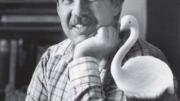Country Dance to Supercomputing. The previous College Pump celebrated the durability of conventional publishing in a digital age (“Paper Persists,” May-June, page 80). Almost immediately, the Fall 2016 and Spring 2017 editions of the estimable, eccentric, Harvard Library Bulletin appeared. (Those are the correct cover dates for volumes 27, number 3, and 28, number 1; good scholarship won’t be rushed.) With them came editor Anne-Marie Eze’s note celebrating more than 200 prior issues—and announcing “a period of transition as the Library strives to increase the journal’s reach and scholarly impact in the digital age.” Following the release of volume 28, number 3, the journal converts to an online format.
But first, one must take note of “The Ward Dance Manuscript: A New Source for Seventeenth-Century English Country Dance,” in Fall 2016: a scrupulous 26-page reading, interpretation, and transcription of a single library holding. It is characteristic of the Bulletin’s work (may it find a robust Internet audience). Less characteristic, and perhaps uniquely Harvardian, is the contributor note for the author. It reads, in full: “Aaron Macks is a systems architect with Harvard Business Review and a sometime teacher of country dance. He is currently working building CoKL: Corpus Kalendarium, a digital tool for analyzing the devotional calendars in Books of Hours. His previous research includes automated parsing of Akkadian verb-forms and clustered supercomputing.”
Career paths. Riffing on the proliferation of higher-education degree and certificate programs, New Yorker online humorist Matthew Osubor recently offered a guide to the “Highest-Paying College Degrees for 2019.” Here’s hoping that most Harvard graduates are set on a suitable course, and so do not rue missing out on the “B.S. in facts and alternative facts,” the “M.F.A. in freelance,” the “A.A. in juice-bar tending,” or (most important of all) the “M.A. in mature adulting.”
The Teaching Life. Memorial minutes presented to the Faculty of Arts and Sciences during the year illuminated the teaching lives of Milton and Cervantes scholars.
The late Kenan professor of history and literature and of English Barbara Keifer Lewalski, one of a dozen tenured women at the University when she arrived in 1982, stayed late on campus one evening before heading for home, in Rhode Island, during a nor’easter. After hours of labored driving, her car “spit flames from under the hood. ‘That’s not good,’ she said, steering to the side of the road.…The flames were now leaping higher than the windshield and black smoke was filling the car, so she came to a stop and engaged the parking brake. But before getting out, she retrieved from the back seat her coat and her briefcase, filled with student papers. She then retired to a safe distance from which to watch the fire department arrive and put out the flames.”
As for the late Porter professor of Romance languages and literatures Francisco Márquez Villaneuva, “Scholarship and teaching were always intertwined, as his most influential books originated in courses (he never repeated a seminar in almost 50 years).”
Stephen Jay Gould—paleontologist, baseball fan, and popular scientist writ very large—was finally memorialized by the FAS this past winter (he succumbed to cancer in 2002). He was remembered in anecdote (“enthralling audiences, often for the full 90 minutes of his hour-long programs”), and more seriously, thus:
A New York Times op-ed written by Steve in the wake of 9/11 memorably captures his unique ability to blend science and humanism:
“We may reaffirm an essential truth too easily forgotten, and regain some crucial comfort too readily foregone. Good and kind people outnumber all others by thousands to one. The tragedy of human history lies in the enormous potential for destruction in rare acts of evil, not in the high frequency of evil people.…Thus, in what I like to call the Great Asymmetry, every spectacular incident of evil will be balanced by ten thousand acts of kindness, too often unnoted and invisible as the ‘ordinary’ efforts of a vast majority.”









